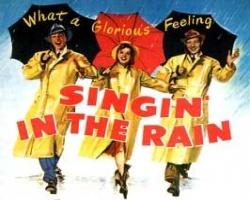Hands down, my all-time favorite movie. So much so that I spent four months writing my master’s thesis with Singin’ in the Rain as the subject. I read the screenplay, along with every book written about the film, about Gene Kelly and about anything remotely related to the film. Hundreds of hours and nearly 50 pages later, I had finished my thesis and added a few initials to the end of my name.
Singin’ in the Rain is a frolicking satire of the tumultuous transition from silent films to talkies. The Jazz Singer had revolutionized Hollywood, and everyone was reeling to jump on the bandwagon. Singin’ centers on the fictitious Hollywood “It” couple, Don Lockwood and Lina Lamont. Both their worlds are turned upside down as Lina must overcome her fingernails-on-the-chalkboard voice if she wants to continue her Hollywood success, and Don finds himself smitten with a feisty dancer named Kathy Selden. The studio executives want to turn the latest Lockwood-Lamont film into a talkie, but everything that can go wrong does go wrong. The solution to their cinematic difficulties: make it a musical. They add singing and dancing, they dub Lina’s vocals; in the end, Don and Kathy live happily ever after. Along the way, we get to enjoy some of the greatest song-and-dance routines ever captured on film.
While this film is just plain fun to watch (I dare you to try to watch it without smiling), it teaches an important relationship lesson. When we first meet Don Lockwood, he is on the red carpet recounting the story of his rise to fame for a crowd of adoring fans. In a textbook example of dramatic irony, we see the truth of his less-than-dignified road to stardom. He schlepped his way to the top in slightly different fashion than his story makes it seem.
When we—and Don—first meet Kathy, she tells Don she’s on her way to New York to break into the dignified profession of stage acting. She puts down Don for being a screen actor and shuts down his flirtatious advances. Shortly thereafter, we learn the truth that she is merely a dancing girl in the floorshow at the studio release party.
Two liars—liars who lie to impress those around them. For Don and Kathy, being caught in their lies just means an embarrassing moment a few moments later in the film. They blush coyly as their lies are exposed, but soon all is forgiven and forgotten. Often, those of us who aren’t characters in a 1950s romantic comedy are not so lucky. Lies we tell to impress or to get out of sticky situations often backfire on us, leaving us with more than a coy blush in our cheeks. Lies can damage or destroy relationships. Lies can ruin careers and reputations. A few ill-chosen words can cause a lifetime of damage.
Yet these potentially lethal consequences seem to have little effect on the choices we make and the words we say. Knowing full well what may be in store for us if our lie is found out often does very little to prevent us from telling that lie.
Why is that? Why are we willing to risk so much? Why are we more afraid of telling the truth than of being caught in a lie?
Perhaps we believe the illusion of security that is found in predictability. We can anticipate the response to the lie, whereas the reaction to the truth may be more than we think we can handle. Alas, that security is nothing more than an illusion.
We all know Jesus’ famous words: “The truth will set you free.” That doesn’t mean telling the truth will be easy. That doesn’t mean there won’t be negative consequences. However, there is freedom to be had in telling the truth.
Mark Twain once said, “Tell the truth, and you’ll never have to remember anything.” Lies bring entanglements, complications and consequences most of us aren’t prepared to deal with. The truth brings freedom, liberty and peace. The characters in a 1950s musical may be able to get away with a little lie here and there, but the rest of us aren’t usually that lucky.
Take it Further (questions to engage students):
1. Have you ever thought lying might be easier than telling the truth? What did you do in that situation? How did things work out for you?
2. Have you ever been caught in a lie? What did you lose by lying? Were you ever able to regain what you had lost?
Ryan M. Blanck is a writer and teacher from Southern California. He is the author of the just-released Engaging the Media 2.0. Like him in Facebook and follow him on Twitter.




